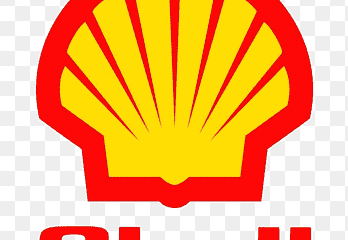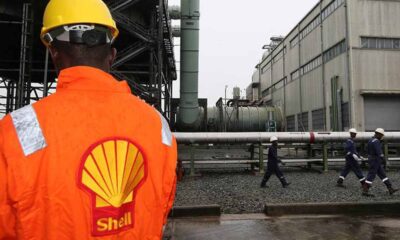Business
Oil spill: Dutch court orders Shell to compensate N’Delta farmers

A Dutch court has ordered the Nigerian subsidiary of Shell to pay compensation over oil spills in Nigeria’s Niger Delta, a ruling which could pave the way for more cases against multinational oil firms.
The Court of Appeal in The Hague on Friday ruled that the Nigerian arm of the British-Dutch company must issue payouts over a long-running civil case involving four Nigerian farmers who were seeking compensation, and a clean-up, from the company over pollution caused by leaking oil pipelines.
It held Shell’s Nigerian subsidiary liable for two leaks that spewed oil over an area of a total of about 60 football pitches in two villages, saying that it could not be established “beyond a reasonable doubt” that saboteurs were to blame.
The Hague appeals court ruled that sabotage was to blame for an oil leak in another village.
However, it said that the issue of whether Shell can be held liable “remains open” and the case will be continued as the court wants clarification about the extent of the pollution and whether it still has to be cleaned up.
Under Nigerian law, which was applied in the Dutch civil case, the company is not liable if the leaks were the result of sabotage.
Shell Nigeria is sentenced to compensate farmers for damages,” the court said in its ruling, which can be appealed via the Dutch Supreme Court.
The amount of compensation will be established at a later date. The court did not specify how many of the four farmers would receive compensation.
The court did not hold Shell’s parent company, which is based in the Netherlands, directly responsible.
However, it ruled that Shell’s parent company and its Nigerian subsidiary must fit a leak-detection system to a pipeline that caused one of the spills.
The case was initiated in 2008 by the farmers and the Friends of the Earth campaign group, who were seeking reparations for lost income from contaminated land and waterways in the Niger Delta region, the heart of the Nigerian oil industry.
The spills concerned were between 2004 and 2007, but pollution from leaking oil pipelines remains a big problem in the Niger Delta.
“Tears of joy here. After 13 years, we’ve won,” the Dutch branch of Friends of the Earth tweeted following Friday’s ruling.
Donald Pols, head of the NGO’s Dutch branch, described the court’s decision as “fantastic news for the environment and people living in developing countries”.
“It means people in developing countries can take on the multinationals who do them harm,” he said.
Shell argued that saboteurs were responsible for leaks in underground oil pipes that have polluted the delta. The company also argued that it should not be held legally responsible in the Netherlands for the actions of a foreign subsidiary, meaning Shell Nigeria.
After the ruling, Shell said it would continue to believe the spills were caused by sabotage, adding it was dismayed that its Nigerian subsidy – the Shell Petroleum Development Company of Nigeria (SPDC) – was judged to be culpable.
“We are … disappointed that this court has made a different finding on the cause of these spills and in its finding that SPDC is liable,” the company said in a statement.
The Nigerian subsidiary added: “Like all Shell-operated ventures globally, we are committed to operating safely and protecting the local environment.”
Shell discovered and started exploiting Nigeria’s vast oil reserves in the late 1950s and has faced heavy criticism from activists and local communities overspills and for the company’s close ties to government security forces.
Friends of the Earth, which has supported the Nigerian farmers in their legal battle, argues that leaking pipes are caused by poor maintenance and inadequate security and that Shell does not do enough to clean up spills.
– aljazeera.com
Business
PH refinery: 200 trucks will load petroleum products daily, says Presidency

PH refinery: 200 trucks will load petroleum products daily, says Presidency
No fewer than 200 trucks are set to load petroleum products at the government-owned Port Harcourt Refinery, the presidency has said.
A presidential spokesperson, Sunday Dare, made this known in a statement through his official X handle on Tuesday.
Newstrends had reported that the Nigerian National Petroleum Company on Tuesday announced that Port Harcourt Refinery has resumed operations and crude oil processing after years of inactivity.
READ ALSO:
- US-based Nigerians get 30-year sentence over $3.5m romance scam
- 4 Nigerians arrested in Libya for alleged drug trafficking, infection charges
- BREAKING: Port Harcourt refinery begins operation
Reacting, Dare said, “200 trucks are expected to load products daily from the refinery, Renewing the Hopes of Nigeria.”
He added that “the Port Harcourt refinery has two wings.
“The Old Refinery comes on stream today with an installed production capacity of 60, 000 barrels per day of crude oil.”
PH refinery: 200 trucks will load petroleum products daily, says Presidency
Business
Breaking: CBN increases interest rate to 27.50%

Breaking: CBN increases interest rate to 27.50%
The Central Bank of Nigeria (CBN) has raised the lending interest to 27.50 per cent from 27.25 per cent.
This latest increase in the Monetary Policy Rate came after a meeting of the Monetary Policy Committee (MPC) of the Central Bank of Nigeria (CBN) on Monday and concluded Tuesday.
The Monetary Policy Rate measures the benchmark interest rate.
The CBN Governor, Yemi Cardoso, announced this in Abuja on Tuesday after the MPC meeting, last for the year, held at the apex bank’s headquarters.
He said the MPC voted unanimously to raise the MPR by 25 basis points from 27.25% to 27.50%; and retain the Cash Reserve Ratio (CRR) at 50% for Deposit Money Banks and 16% for Merchant Banks.
The CBN governor also said the MPC retained the Liquidity Ratio (LR) at 30% and Asymmetric Corridor at +500/-100 basis points around the MPR.
Business
Nigeria’s unemployment rate dropped to 4.3% in Q2 – NBS

Nigeria’s unemployment rate dropped to 4.3% in Q2 – NBS
Nigeria’s unemployment rate stood at 4.3 per cent in the second quarter of 2024, the National Bureau of Statistics (NBS) has said in its latest report.
The report released on Monday said the unemployment rate decreased compared to the 5.3 per cent recorded in the Q1 of 2024.
The NBS defined the unemployment rate as the share of the labour force (the combination of unemployed and employed people) who are not employed but actively searching and are available for work.
“The unemployment rate for Q2 2024 was 4.3%, showing an increase of 0.1 percentage point compared to the same period last year,” the report stated.
“The unemployment rate among males was 3.4% and 5.1% among females.
“By place of residence, the unemployment rate was 5.2% in urban areas and 2.8% in rural areas. Youth unemployment rate was 6.5% in Q2 2024, showing a decrease from 8.4% in Q1 2024.”
Report also said the unemployment rate among persons with post-secondary education was 4.8 per cent; 8.5 per cent among those with upper secondary education, 5.8 per cent for those with lower secondary education, and 2.8 per cent among those with primary education in Q2 2024.
Employment rate – 76%
The report showed that the employment-to-population ratio, which measures the number of employed workers against the total working-age population, increased to 76.1 per cent in Q2 2024.
“In Q2 2024, 76.1% of Nigeria’s working-age population was employed, up from 73.1% in Q1 2024,” the report stated.
Self-employment – 85.6%
The report further showed that Nigeria’s labour market saw a notable shift as the proportion of self-employed individuals increased in Q2 2024.
It stated, “The proportion of persons in self-employment in Q2 2024 was 85.6%.”
-

 metro10 hours ago
metro10 hours agoBREAKING: Port Harcourt refinery begins operation
-

 Business2 days ago
Business2 days agoJust in: Dangote refinery reduces petrol price for marketers
-

 metro1 day ago
metro1 day ago40-foot container falls on car in Lagos
-

 Politics2 days ago
Politics2 days ago2027: Lagos Speaker, Obasa joins gov race, may battle Seyi Tinubu, others
-

 Politics1 day ago
Politics1 day agoLagos 2027: Seyi Tinubu campaign team releases his life documentary
-

 International1 day ago
International1 day agoTrump to sack 15,000 transgender officers from U.S. military: Report
-

 Entertainment1 day ago
Entertainment1 day agoPolygamy best form of marriage for Africa – Okey Bakassi
-

 metro1 day ago
metro1 day agoPolicewoman dismissed in Edo threatens to kill children, commit suicide















You must be logged in to post a comment Login